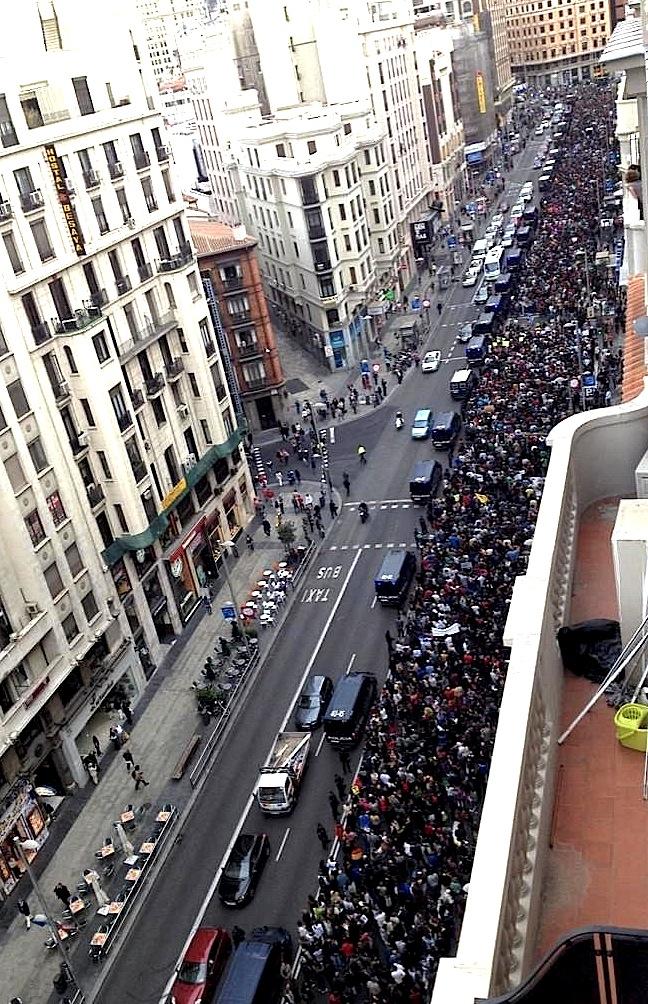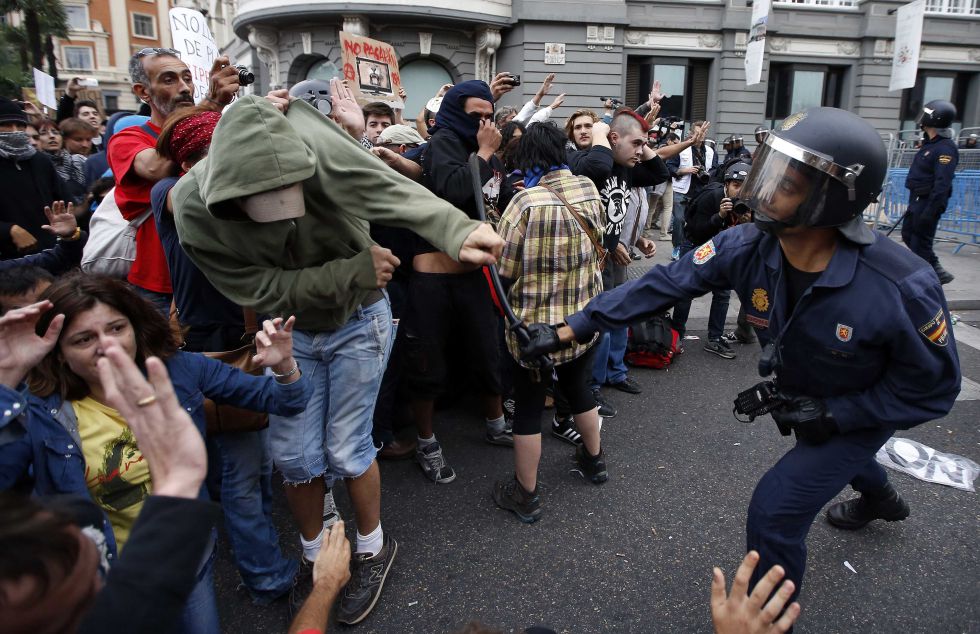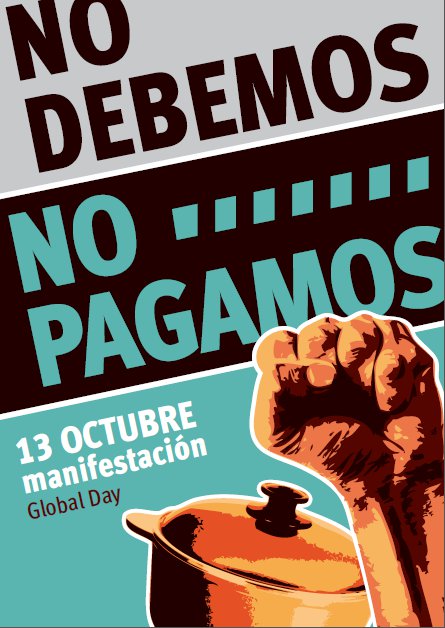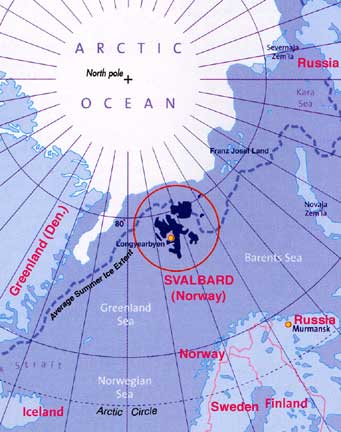At a Strike Debt meeting yesterday, we discussed the joint call for action on O13. One person looked askance and commented: “We better not just get 25 people wandering around New York.” In other words, the tens of thousands that routinely turn out for Europe’s anti-austerity demonstrations are likely to be matched on a scale of one in a hundred at best in the U. S. Why are we still so marginalized?
It’s certainly true that the Eurozone disaster is extraordinary. And of course, Occupy is no more than a year old. In a broadside published today, Rebecca Solnit isn’t having any of it. She firmly blames the left for its own divisiveness and celebration of failure. Having begun to think about hope, she writes,
I eventually began to refer to my project as “snatching the teddy bear of despair from the loving arms of the left.” All that complaining is a form of defeatism, a premature surrender, or an excuse for not really doing much. Despair is also a form of dismissiveness, a way of saying that you already know what will happen and nothing can be done, or that the differences don’t matter, or that nothing but the impossibly perfect is acceptable.
This tendency to not only see defeat looming but revel in it is a familiar figure. The great heroes of the left from the Commune to the Spanish Civil War and so on all lost. It was the second edition of the first ever punk fanzine Sniffin’ Glue that declared punk dead back in 1977.
Now, however, there’s an added social media snarkiness to it all. All over ZuckerBook you can read dismissals of OWS, its publications and campaigns as being insufficiently anti-capitalist and otherwise deluded. As if posting to Facebook was anything other than a way of making money for its shareholders.
All that said, there are real contradictions here. As a number of people have pointed out, and I am well aware myself, my explorations in militant research are a part of my privilege. I tend to think it a better use of that situation than simply perpetuating the status quo but nonetheless it is fair to ask whether it helps people in the New Academic Majority. My hope is that by acting and writing in the way that I would prefer to do, I make it possible for others to do the same and use my project as a model or reference. That said, you won’t hear much from me after 12/31/12 for a good long time.
For Occupy more broadly, the feminist-inspired culture of trust, process and love has been one of its great accomplishments. But when I hear, as you do from time to time, someone yelling at someone else that they are “bourgeois” or some other infraction, it’s always a male-identified person defining a female-identified one.
At the first GA I remember attending in Zuccotti, I was impressed by a young woman of color talking about the way the assembly did not yet look like New York City. Well, what’s left of that body still doesn’t resemble its parent metropolis, and there’s a renewed bout of questioning as to why. Some people are criticizing the topics we’ve highlighted recently, such as debt, as if debt did not affect the poorest and most discriminated against in our society. Can we do better? No question. But there’s a real issue out there. Here’s a visualization of payday loan stores in Bushwick. There are a lot in a small area.
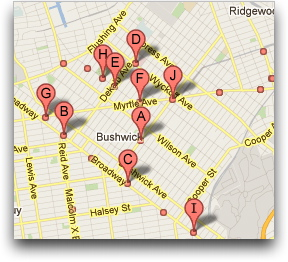
Here’s the Upper East Side:
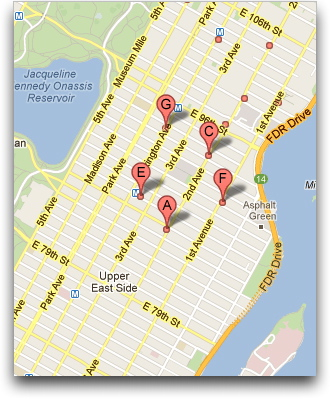
Exclude A and C which are bank branches and you have three such payday loan places from 59th St to 106th St on the entire East Side.
So why is OWS in general and Strike Debt in particular still lacking diversity? Part of it stems from the bulk of Solnit’s article about the election. African Americans are strong supporters of Obama, with over 90% in most polls saying they will vote for him. If anyone was in any doubt that Republican hatred for Obama was motivated in whole or in part by race, the rash of “chair lynchings” that followed Clint Eastwood’s speech should have settled the issue. If you’ve missed this, a set of chairs have been hanged in trees with American flags attached to them. Given Eastwood’s identification of an empty chair with Obama, the message is as clear as it is repellent. In the 1960s civil rights activists carried US flags to claim equal rights in contrast with the Confederate flag. The Vietnam War put paid to that association and the flag can now be meaningfully tagged with racist murder.
So while how to vote is almost a technical debate in New York or California, at least at Presidential level, it’s not hard to see why people of color, women, LBGTQI folks and many others don’t see it that way. As Solnit trenchantly puts it:
You don’t have to participate in this system, but you do have to describe it and its complexities and contradictions accurately, and you do have to understand that when you choose not to participate, it better be for reasons more interesting than the cultivation of your own moral superiority, which is so often also the cultivation of recreational bitterness.
The reduced numbers of active people in OWS need to heed such warnings and realize that we can’t turn things our way by hyperactive organizing alone. It turned out that the crisis was not of a brief duration and nor was there to be a revolutionary solution to it. Perhaps for a moment last October we glimpsed the mountaintop but we’ve slipped a long way down the slope since then. That’s OK. Instead of turning on each other, we need to turn outwards and start engaging with the constituencies we most want to be in dialog with.
Like this:
Like Loading...










